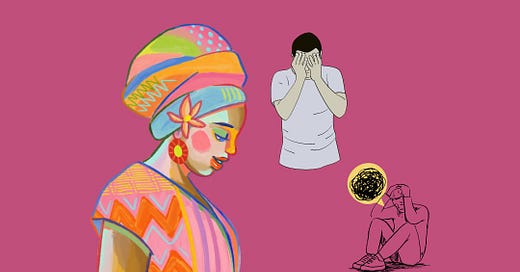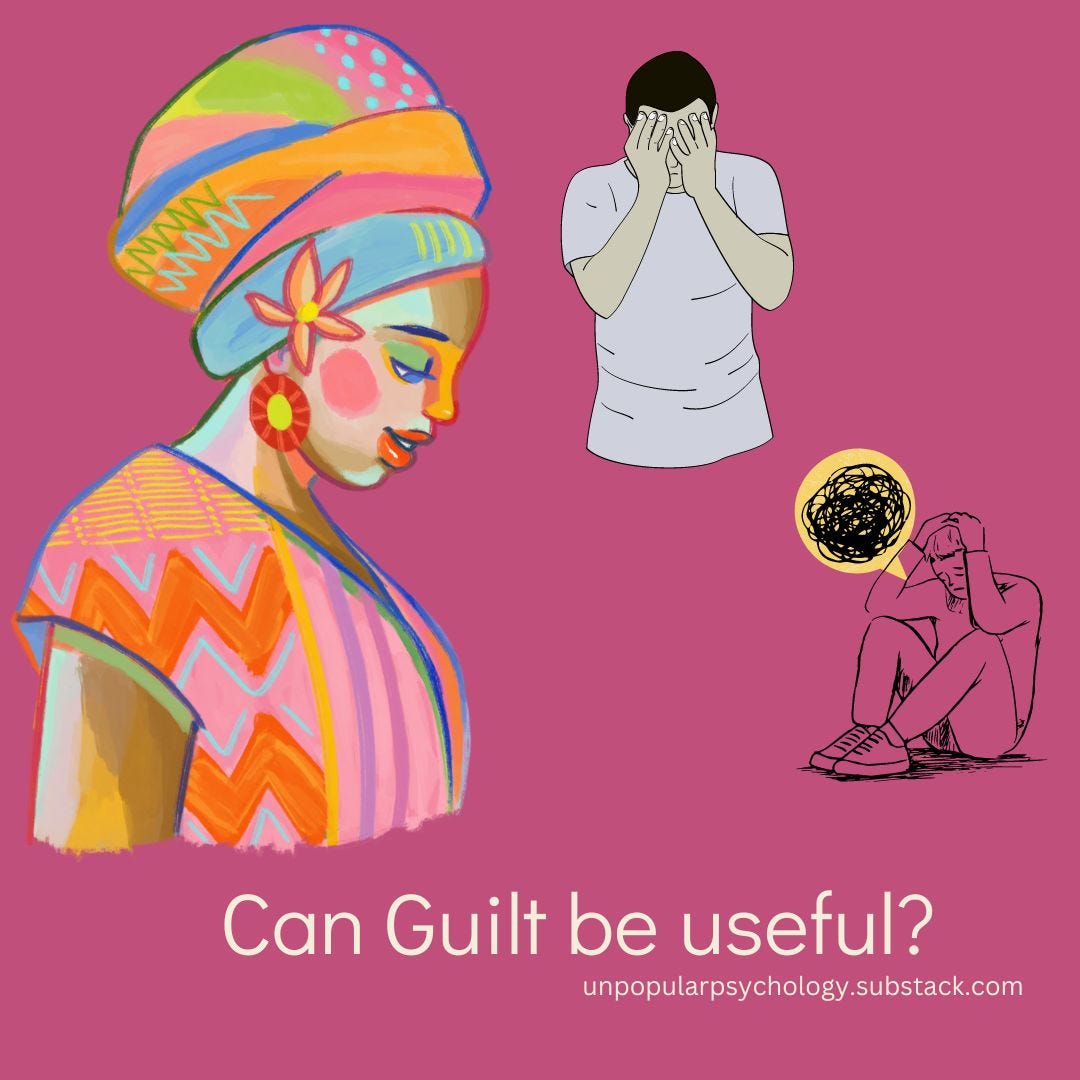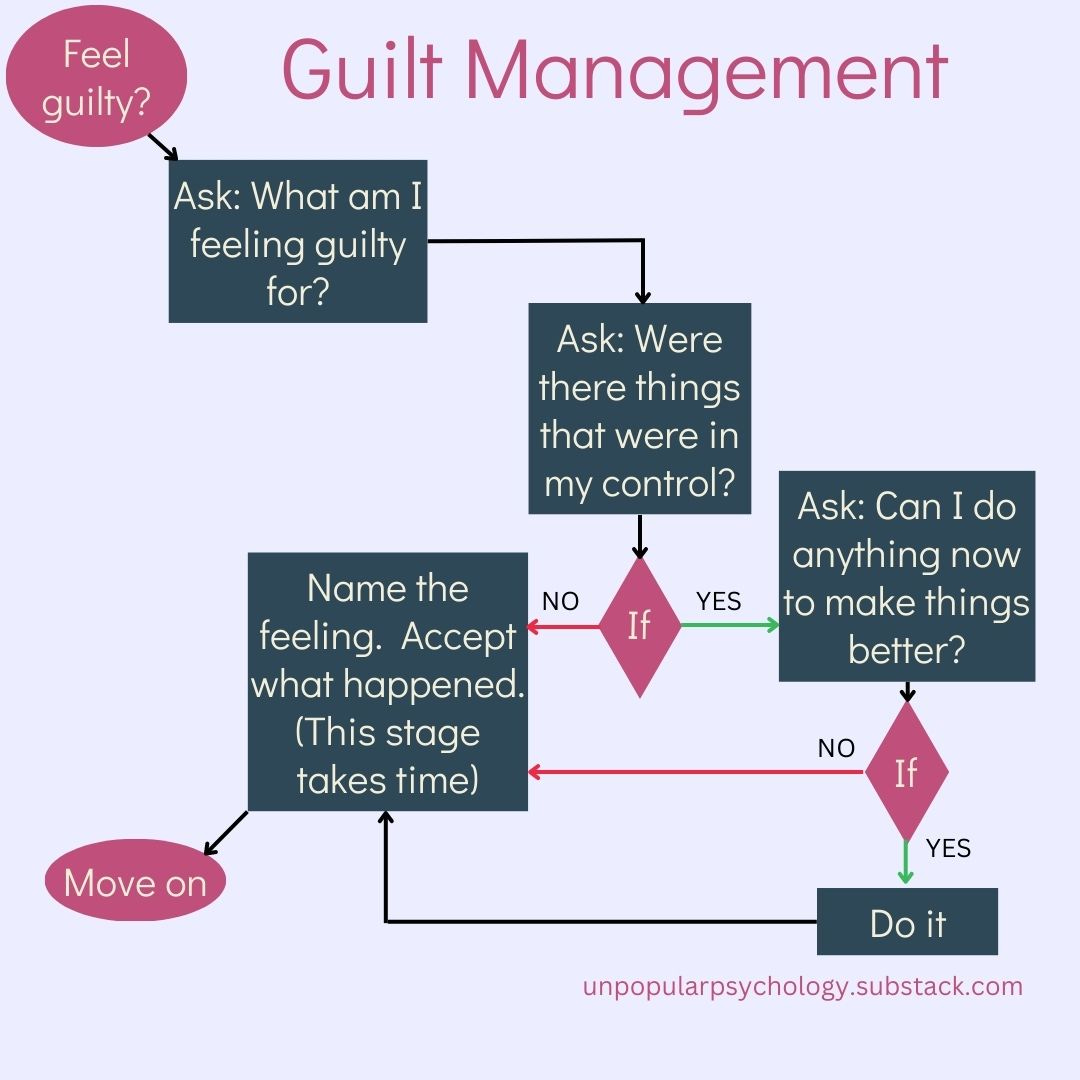I. A Lame Introduction
“You don’t have to feel guilty, that’s not on you.”
- Anju
I‘m guilty of saying this to many of my friends. But I’ve changed my stance on guilt quite a bit since then. Now I need you to help abate my guilt - by telling me to not feel guilty for having told others to not feel guilty. But what if you, my consolers, secretly feel that I’m right to feel guilty? You should feel guilty for lying to me. But who will assuage your guilt afterwards? If we keep going like this, do you think we’ll eventually make our world guilt-free?
This was not how I meant to start this post but I feel that thinking about serious topics need not be done so seriously. So I guess it’s okay that I got us into this guilt quagmire this quickly with no warning? Or would you like me to feel guilty about it? I can house some guilt, no problem, but you got to come and save me from it, okay? You have to tell me that I did nothing wrong, that this is not on me. Okay, okay, I’m stopping, and, post title notwithstanding, I refuse to feel guilty about this whole thing by the way.
What will a guilt-free society even look like? A child refusing to say sorry for beating another kid up. Everybody cancelling on their dates last minute. Children going hungry because their mothers were hosting Instagram lives. Aged parents being abandoned on the street. Fewer scientific discoveries because Alfred Nobel had no reason. How horrific!
Thankfully, all this was just my imagination running wild.
II. What’s the guilt landscape looking like in 2023?
We feel guilty for everything. We feel guilty for ending a terrible relationship but we also feel guilty for not ending it sooner. We feel guilty for going to work when the kids are at home but we also feel guilty when we call work off for family. We feel guilty for getting promoted, we feel guilty when we have an extra gulab jamun, we feel guilty for falling sick, we feel guilty for eating chicken.
A Psychology Today article that I came across while doing research for this post estimated that we spend close to 5 hours a week feeling guilty. I’m surprised that the number is this low. Maybe the serial killers are messing with the averages.
I’m surprised because, to me, guilt makes so much evolutionary sense.
III. Why do we even feel guilty in the first place?
Might be a bit tough to encapsulate all of the literature on the evolutionary underpinnings of guilt in a single post but here are the highlights:
1. Guilt helps us stick to rules and avoid punishment
Example - Let’s take a situation where I’m contemplating stealing money from a friend. If I go ahead with it, I get a few hundred bucks. I can probably use it to buy something, maybe some groceries, you know with me being a fledgling writer and all. Until I get caught or confess (and we’ve no idea if or when that’ll happen), I’m going to be plagued by guilt. And if my friend does find out, what if they tell my other friends about this?
The end outcome of this contemplation would mostly be that I fall in line with my friend’s expectations of me - that I don’t steal their money.
Moral-of-this-story: Guilt makes us behave in ways that help us avoid punishment. Guilt also makes us behave in ways that we want others to behave to us.
Don't do unto others what you don't want done unto you.
- Confucius
2. Guilt helps us cooperate
Example: My friend and I decided that instead of applying to colleges this year, we will focus on our band. My family is unhappy. They are encouraging me to apply to at least a few of the Ivy Leagues because you know, what if. I’m tempted. But I’ll be wracked with guilt if I apply without telling my friend. Most likely, the anticipation of guilt will prevent me from going behind their back and applying. And who knows, I might even put in some extra effort into my band. If our band does manage to make it big, it will reinforce my decision to cooperate with my friend even in the future.
Moral-of-this-story: Guilt can help us cooperate better in joint projects even when they’re risky. When successful, this can in the long term lead to great rewards.
3. Guilt helps facilitate forgiveness
Example: Your partner just confessed to having cheated on you. People are found to commit infidelity due to a variety of reasons. Whatever be the reason that made your partner seek love outside of your relationship, they now feel sorry about what they’ve done. They want you to take them back.
How will you decide? The top 2 factors that you most probably will consider are:
Are they truly sorry? (Read: Are they actually feeling guilty for what they did?)
Will they do it again? (Which in some measure depends on how guilty they are and the costs that they are willing to pay for their transgression)
People can sometimes fake guilt (I’m sure you’ve heard of ‘Once a cheater, Always a cheater’) and therefore fake sincere-seeming apologies but in the long term, this tends to not work out as well. Once a pattern of cheating emerges, people will be less likely to believe you.
Moral-of-this-story: Feeling guilty is often necessary to (successfully) show that you’re guilty, because when you truly feel guilty is when you’re more likely to apologise convincingly. A convincing apology increases your chances of being forgiven, and fetches you a second chance.
IV. If guilt is supposed to be this helpful, why is it such a sucky feeling? Why doesn’t guilt feel better?
Because not everything that is useful necessarily feels good. We’d all be taking ice cold showers at 5am if that was the case. Many times, the good stuff actually feels quite terrible.
Guilt feels sucky for the same reason that fear feels sucky. Nobody likes to be scared. But fear is SO necessary for survival. If a baby accidentally wanders a little too far away from its mother, that baby better feel terrified (no matter how unpleasant the feeling). It’s going to die otherwise. Or what about a company that is booking severe losses? Some fear will help the leadership strategize better and towards profit-making. Or in my case, say I’m walking late at night on a poorly lit street and I see a man following me. Some fear will help me be prepared in case there is an attack. Although my mother has been preparing me for this possibility since the day I was born, I would still need some real-time fear to pump up the adrenaline.
My point being that we aren’t given a choice sometimes in how we feel because we’ll make the wrong choice.
V. Examining Popular Psychology’s allergy to guilt
If guilt is so useful, why do Popular Psychology practitioners hate the feeling? Is there any substance in the hate?
Like I explained in Section III, guilt is helpful most times. Feeling guilty helps us adapt better to the groups we are part of, the religions we follow, the families we are born to, the people we marry, the children we raise and the societies we live in. And while the outward facing side of guilt is helpful, the inward facing side of it need not work the same way. In fact, if the inward facing side of guilt is not managed properly, it can do the exact opposite of what your brain intended to do with the emotion in the first place. It can cause you to behave in ways that threaten your survival. Psychologists call this maladaptive behaviour. Take people who suffer from bulimia, for example. They engage in repetitive bingeing and purging behaviour out of guilt. Another example is that of a child who neglects their studies on account of the guilt they feel for their parents’ divorce.
Does this mean that there are healthy and unhealthy kinds of guilt?
Yes.
How do you know if your guilt is healthy? Healthy guilt is marked by 3 factors:
Healthy guilt is rational: If you are feeling guilty because you skipped your workout despite having nothing else to do at the time, your guilt is rational. If you’re feeling guilty about missing your workout because you couldn’t find a babysitter — probably not rational.
Healthy guilt is proportionate: Healthy expressions of guilt involve taking responsibility only for the actions that were in your control. Unhealthy expressions of guilt are often marked by excessive self-punishment e.g. starving yourself because you had 1 too many cupcakes.
Healthy guilt is forward-looking: Let’s reuse the skipping-your-workout example. What are you doing with the guilty feeling? Are you telling yourself “I missed gym today for no reason, maybe I’ll do a few pushups at home”, and then of course doing it OR are you wallowing in that guilt, letting yourself go and order a burger?
Below is a framework that could come in handy whenever you catch yourself navigating all this healthy-unhealthy guilt business.
VI. Don’t just be sorry, be better
If the guilt that you’re feeling is healthy, proportionate and forward-looking, then what is left for you to do is to avoid future guilt (to the extent possible).
Like I said earlier, guilt is useful insofar that it helps you largely stick to rules, avoid punishment and apologise earnestly when you defect. If you don’t channel your guilt towards making amends and changing behaviour, that is going to frustrate people around you in the short term and become costly for you in the long run. Fakers don’t last.
And by the way, just because you feel guilty, that does not mean that you have to spend a lot of time understanding and processing it (I’ve written about the uselessness of spending too much time on your feelings without good reason here).
All this to say, in the right amounts and for the right things, please go ahead and feel guilty!
I’ve a lot more to say about guilt. But maybe I should save those guilt-ridden thoughts for a bonus post at some point. No promises yet, I don't want to feel guilty later:) In the meanwhile, if you want to engage with some of these ideas in greater detail, the comment section is wide open.
If you had fun reading this post and want to thank me, here are 3 ways to do it. You don’t have to do it if you don’t feel like it, no guilt-tripping here :p






